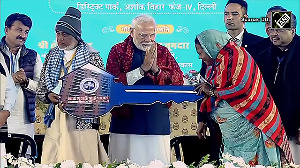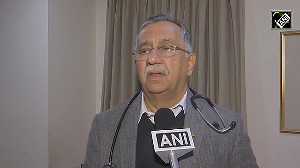Many associations of urban dwellers across the country are assuming powers they do not possess and behaving like tinpot dictators, says Shuma Raha.
Illustration: Uttam Ghosh/Rediff.com

A friend who stays in an upscale condominium in Gurugram found himself in a strange situation.
It was April 5, the day set by Prime Minister Narendra Damodardas Modi for citizens to respond to his request to switch off their lights at 9 pm and light up candles and diyas on their balconies for the next nine minutes.
Although Modi had not said that the instruction was mandatory, the Resident Welfare Association (RWA) of the apartment complex took it upon itself to order everyone to carry out the PM's wish.
Lights had to be mandatorily switched off, diyas and candles had to be mandatorily lit on every balcony for the said nine minutes, or else.
My friend refused to comply -- blame it on his unenlightened world view -- and was soon involved in a fierce WhatsApp spat with the RWA.
Finally, he was able to stave off the lights-off-diya-on diktat only after he declared that he would use that time to make online donations to some agencies providing food to those who had lost their livelihoods in the wake of the nationwide lockdown to contain the spread of the novel coronavirus.
This is not a one-off case.
As if all the hardships of a lockdown were not enough, many RWAs and associations of urban dwellers across the country are assuming powers they do not possess and behaving like tinpot dictators who have suddenly found the means to subjugate their tiny enclaves.
Obviously, the lockdown rules need to be followed and directives to that end are justified.
But in far too many cases, resident bodies are going above and beyond their remit to impose orders and restrictions that smack of boneheaded tyranny rather than good sense.
Tales of extreme high-handedness, verging on the illegal, abound.
In a particular sector in Noida, the gates of one block were shut off to residents of the adjacent block even though the Mother Dairy booth was situated in the former.
It took several days to convince the RWA concerned to make arrangements so people could get their milk from the Mother Dairy booth.
In yet another example, some people in an apartment complex in Gurugram filed a complaint on the prime minister's complaints portal against fellow residents who were continuing to walk in the common areas post the lockdown in defiance of the RWA's wishes.
The police picked up the complaint and sent a note of warning to the offenders.
Now even if it was felt that taking a walk inside a closed, gated complex while maintaining physical distance from each other heightened the risk of infection, should they have gone to the extent of filing a formal complaint?
At best, this is akin to over-zealous class monitors desperately trying to please the teacher; at worst, it reminds one of Germany under the Nazis, when neighbours snitched on neighbours -- for being Jews, for hiding Jews, or for not exhibiting their loyalty to the Führer in due measure.
To be sure, these are not normal times.
We are living in a state of constant dread and anxiety.
It's not just the spectre of sickness and death by an invisible, not-quite-alive virus that terrifies us -- it's also the sense that all the certainties of life as we knew it are crumbling all around us.
But even so, the need for 'abundant caution' against the contagion cannot become a licence for despotic behaviour on the part of those who helm these resident bodies.
Just as a worldwide pandemic ought not to become an excuse for countries to suspend democratic rights and segue into dictatorships.
At the best of times, many of these RWAs are not exactly standard-bearers of democratic principles.
In their zeal to preserve their idea of 'moral order', they are often homophobic and hostile to single women and Muslims.
Their WhatsApp chat groups are often filled with outrageous fake news and propaganda.
And they are quick to shout down anyone who posts a counter to the fake news of the day.
It could be that the fear of the coronavirus has exacerbated the controlling instincts of those who feel they are the first line of defence against social chaos.
The fear is understandable -- its devolution into unfettered tyranny and vigilantism is not.
Shuma Raha is a journalist and author.












 © 2025 Rediff.com -
© 2025 Rediff.com -